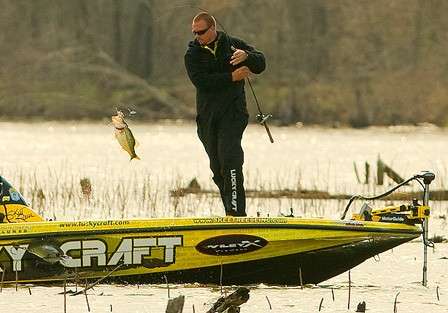
If you’re trying to get to a bass in the Red River, you’ll have to clear more than a few hurdles. From the locks and dams that make commercial navigation possible to the stumpy backwaters that harbor healthy bass populations, numerous obstacles stand between Bassmaster Classic anglers and the winning fish.
“It’s by far the stumpiest place I’ve ever fished,” said Aaron Martens, who finished ninth here in the 2009 Classic. “The first day of practice – even the first hour of practice – you’ll do more damage to your boat than you’ll do all season.”
Martens tore up a $700 propeller during the 2009 Classic on the Red River. He also stuck his boat on a stump in another backwater area.
“It was right below the surface and I couldn’t see it,” Martens said. “Everybody gets stuck here, though. Last time, you could hear motors revving up in the distance. It was people trying to get unstuck.”
Being stuck means you’re not fishing, and any loss of fishing time can prove devastating to an angler’s chance of winning the Classic. And even if an angler avoids sticking his boat on a submerged snag, the mere presence of the stump fields can cause considerable lost fishing time.
“It can take a long time to get to your fish because you have to idle real slow through these stump fields,” said Edwin Evers, who took fifth place in the 2009 Classic.
The locks and dams also wreak havoc from the standpoint of time management. When you’re sitting in a lock, you’re lures aren’t in the water.
“I generally don’t like locking,” Martens said. “When you put your boat in the lock, it’s nerve-wracking the amount of time you lose.”
It can take half an hour, often longer, to lock through from one river pool to the next. And there’s always the possibility of commercial barge traffic, which generally gets priority lock access from the U.S. Army Corps of Engineers, which operates the system.
During the 2011 Elite Series season, locks plagued anglers at the Arkansas River stop in June. Several anglers had a day’s catch disqualified after losing time in the locks and arriving late at the afternoon check-in.
But passing through a lock to fish in a more distant area can mean getting farther from the crowds or gaining access to less pressured fish.
“I just have to go to my best fish,” Evers said. “I can’t let locks alter my decision. I’m going to where I can catch the fish to put the most weight on the scales. Whether that’s one lock, two locks or no locks, it doesn’t matter. I’m going to the place that gives me the best chance to win.”
Another obstacle will come into play during this year’s Classic – other anglers. The Red River is a muddy mess right now, with vermillion waters reaching even into backwater areas that are usually immune to the mud’s infiltration. With everyone looking for clearer water to fish, anglers say all 49 boats likely will be bunched into just a handful of spots.
“It’s a good thing it’s not a 100-boat tournament,” Randy Howell said.
“No matter where you go,” Stephen Browning said, “you’re probably going to be fishing behind somebody.”
With so many obstacles in their way, anglers will need to make the most of fishing time and avoid losing composure when things don’t go exactly as planned.
“I just control the things I can control and don’t stress or worry about the things I can’t,” Evers said. “It sounds simple, but you just have to go out and catch one fish at a time.”
